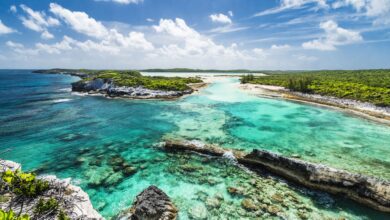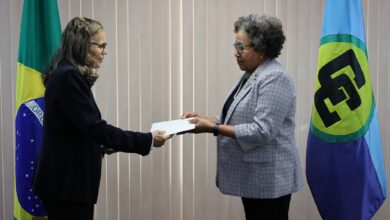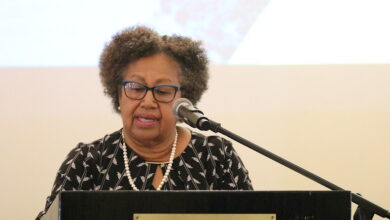(CARICOM Secretariat, Turkeyen, Greater Georgetown, Guyana) Ministers of the Environment have given the green light for a Community approach to tackle environmental and natural resource management and have mandated the Caribbean Community (CARICOM) Secretariat to coordinate consultations with national and regional stakeholders to develop the proposed CARICOM Environment and Natural Resource Policy Framework (CENRPF).
The Secretariat is also to mobilize resources to develop the Draft Community Policy for approval and develop the first communication on the CENRPF to Member States within 12 months.
Agreement on the community approach was one of the major outcomes of the Twenty-Fifth Special Meeting of the Council for Trade and Economic Development (COTED) on the Environment which concluded Friday, 18 April, at the Guyana International Convention Centre, Liliendaal, Greater Georgetown, Guyana.
The Ministers on Thursday agreed that the St. George’s Declaration should be considered in the formulation of the CENRPF and emphasized the importance of ensuring that the proposed Framework was consistent with existing and emerging sector and other specific frameworks being developed in the Region. The St. George’s Declaration Of Principles for Environmental Sustainability in the Organisation of Eastern Caribbean States (OECS) is a guide for undertaking management of their environment, individually and collectively. The commitment to the guide was made after recognition and acknowledgement that environmentally sustainable development is essential for the creation of jobs, a stable society, a healthy economy and the natural systems on which this depends.
Regional officials had earlier called for the community approach after expressing concerns that Member States were adopting individual responses to environmental problems which were not yielding satisfactory results.
In the area of energy, the Meeting endorsed a CARICOM Secretariat proposal to the United Nations Development Programme for the extension of the Caribbean Renewable Energy Development Project (CREDP) for another year. The project was scheduled to end on 26 April 2008. The endorsement was made after the Ministers acknowledged the progress CREDP had made in the development of capacity building for renewable energy in the Region.
The Secretariat is to undertake an independent review of the CREDP to assess its achievements and shortcomings, and ensure that in the implementation of its energy work programme, CREFP’s achievements are built upon.
With regard to agro-energy, the Secretariat now has a mandate to conduct a regional assessment of the renewable energy, including the bio fuels potential of CARICOM. After urging Member States to assess their own national situations on the way forward on national bio fuel policies, the Meeting mandated the Secretariat to provide support to Member States which have agro-energy potential to further develop the capacity to exploit that potential.
On the fringes of the Meeting were an exhibition at the GICC which focused on the myriad aspects of the environment, and the launching of the quarterly journal `The Caribbean Environment’ at the Red House, Georgetown. Among the agencies that participated in the exhibition mounted by the Secretariat were the Pan American Health Organisation (PAHO), World Wild Life Fund (WWF) (Guianas), Conservation International (CI), Iwokrama, Liana Cane Manufacturers, Ministry of Agriculture, and North West Organics.
In addition to Member States, attendees at the COTED Meeting include representatives of organizations including the Caribbean Environmental Health Institute (CEHI), the Caribbean Meteorological Organisation (CMO), the Caribbean






